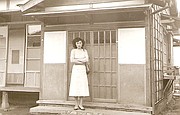Coulee City woman finds family in Japan
COULEE CITY - A Coulee City woman seeking news about her cousins
and aunts living in Japan learned her family is alive.
A week after Japan's 8.9 magnitude earthquake and tsunami, contact
was made with one of Betty Treacy's aunts during the weekend.
Through relatives, Treacy was told her remaining aunts and cousins
were safe.
COULEE CITY - A Coulee City woman seeking news about her cousins and aunts living in Japan learned her family is alive.
A week after Japan's 8.9 magnitude earthquake and tsunami, contact was made with one of Betty Treacy's aunts during the weekend.
Through relatives, Treacy was told her remaining aunts and cousins were safe.
There was minor damage to her youngest aunt's home, said Treacy, of Coulee City.
One of her aunts lives high on a hill and the home only sustained minor damage.
"I don't know what conditions the other houses are in, but they're alive and safe, thank goodness," Treacy said. "It's been a very stressful week."
The fishing village where her family lives is Shiogama, located eight miles north of Sendai, the earthquake's epicenter, she clarified.
After the disasters, she wasn't sure if her relatives had power or water.
"The only news I got was that everyone was safe," she commented.
Treacy, a Moses Lake High School graduate, explained that her connection to Japan was through her late mother, Akiko Treacy.
With her mother passing away after her father, Betty explained how her Japanese side became more important, even after associating more with her father's Irish side.
She's finding she shares some of her mother's facial expressions.
Her mom came to Moses Lake in August 1955 with Betty's father, an Air Force captain, stationed at then Larson Air Force Base.
Betty was born in the U.S. about five or six weeks early, in September 1955.
Her parents met in Japan, when Betty's father, the late William Treacy, was serving at Tachikawa Air Force Base.
Many girls from fishing villages, like Betty's mother, would work at the military bases in Japan, cleaning officers' quarters and taking care of their uniforms.
"My dad picked her," Betty recalled. "He spoke Japanese and he was called the 'fat captain.' He was very friendly and spoke their language. A lot of people wanted to work for him."
Girls like Betty's mother would send their earnings home to their families.
The couple eventually married and moved to the U.S.
Betty's father offered to send Akiko home to Japan for annual visits.
She declined because she considered the U.S. her home and her four children were young.
"She had four kids in three years," Betty recalled, "I think she felt her responsibility was here and went after we grew up."
Her mom learned English with her children.
"We all learned how to speak at the same time," Betty said.
Akiko returned to Japan years later.
During one of her travels, the family pitched in and gave Akiko spending money for her trip.
"I'm glad she got to go," Betty said.



